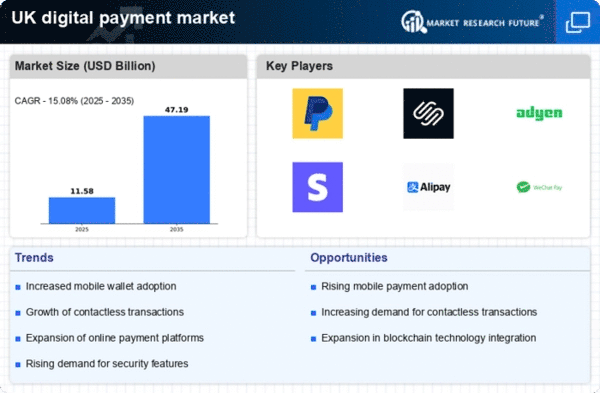Rise of Fintech Companies
The emergence of fintech companies is significantly influencing the digital payment market. In the UK, these innovative firms are challenging traditional banking models by offering agile and customer-centric payment solutions. As of 2025, the fintech sector has seen substantial growth, with over 200 new companies entering the market in the past year alone. This influx of competition is likely to drive innovation and improve service delivery within the digital payment market. Fintech companies are leveraging technology to provide tailored solutions, such as peer-to-peer payment platforms and instant money transfers, which appeal to a tech-savvy consumer base. Consequently, the presence of fintech firms is expected to reshape the competitive landscape, compelling established players to enhance their offerings to retain market share.
Consumer Demand for Convenience
Consumer preferences are shifting towards convenience, significantly impacting the digital payment market. In the UK, a growing number of consumers are seeking seamless and quick payment solutions that fit their fast-paced lifestyles. Research indicates that approximately 70% of consumers prefer using digital wallets for their transactions due to the ease of use and speed they offer. This demand for convenience is driving merchants to adopt digital payment solutions that streamline the checkout process, thereby enhancing customer satisfaction. Furthermore, the rise of subscription services and on-demand delivery platforms is likely to further fuel this trend, as consumers increasingly expect frictionless payment experiences. As a result, businesses that prioritize convenience in their payment offerings may gain a competitive edge in the digital payment market.
Regulatory Support and Frameworks
The regulatory environment in the UK is evolving to support the growth of the digital payment market. The Financial Conduct Authority (FCA) has implemented various measures aimed at fostering innovation while ensuring consumer protection. For instance, the introduction of the Payment Services Directive 2 (PSD2) has encouraged competition and transparency in the payment sector. This regulatory framework is likely to facilitate the entry of new players into the market, thereby enhancing service offerings and driving down costs for consumers. Additionally, the UK government is actively promoting digital financial services, which may further stimulate growth in the digital payment market. As regulations continue to adapt to technological advancements, the market is expected to benefit from increased investment and innovation.
Technological Advancements in Payment Systems
The digital payment market is experiencing rapid technological advancements that are reshaping the landscape of financial transactions. Innovations such as contactless payments, mobile wallets, and blockchain technology are becoming increasingly prevalent. In the UK, the adoption of contactless payments has surged, with over 50% of all card transactions being contactless as of 2025. This shift towards more efficient payment methods is likely to enhance user experience and drive further growth in the digital payment market. Additionally, the integration of artificial intelligence and machine learning in fraud detection systems is expected to bolster security measures, thereby increasing consumer confidence in digital transactions. As technology continues to evolve, the digital payment market is poised for significant transformation, potentially leading to new business models and revenue streams.
Increased Internet Penetration and Smartphone Usage
The digital payment market is benefiting from increased internet penetration and smartphone usage across the UK. As of November 2025, approximately 95% of the UK population has access to the internet, with smartphone ownership reaching over 80%. This widespread connectivity is facilitating the adoption of digital payment solutions, as consumers are more inclined to use their devices for financial transactions. The convenience of mobile banking apps and payment platforms is likely to drive further engagement in the digital payment market. Moreover, the rise of social media and e-commerce platforms is creating new avenues for digital payments, as consumers increasingly shop online and engage in social commerce. This trend suggests that the digital payment market will continue to expand as more individuals embrace technology for their financial needs.
















